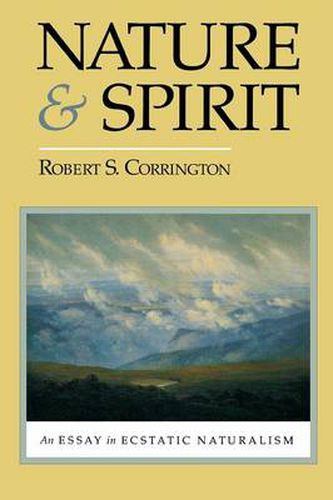Readings Newsletter
Become a Readings Member to make your shopping experience even easier.
Sign in or sign up for free!
You’re not far away from qualifying for FREE standard shipping within Australia
You’ve qualified for FREE standard shipping within Australia
The cart is loading…






This title is printed to order. This book may have been self-published. If so, we cannot guarantee the quality of the content. In the main most books will have gone through the editing process however some may not. We therefore suggest that you be aware of this before ordering this book. If in doubt check either the author or publisher’s details as we are unable to accept any returns unless they are faulty. Please contact us if you have any questions.
Nature and Spirit: An Essay in Ecstatic Naturalism develops an enlarged conception of nature that in turn calls for a transformed naturalism. Unline more descriptive naturalisms, such as those by Dewey, Santayana, and Buchler, ecstatic naturalism works out of the fundamental ontological difference between nature naturing(natura naturans) and nature natured (natura naturata). This difference underlies all other variations within a generic conception of nature. The spirit operates within a generic conception of nature. The spirit operates within a fragmented nature and has its own unique locations. Ecstatic naturalism does not eulogize spirit nor impose a process theodicy upon nature as a whole but carefully describes the ways in which spirit emerges from finite locations within the world.
Methodologically, the text radically regrounds phenomenology so that it can work more closely with a metaphysics seeking the most generic forms of nature. The move from a transcendental phenomenology, which rests upon a profound misconception of the parcel of a radicalized naturalism, makes it possible to show how all orders of relevance are related to nature and to the spirit. This, in turn relocates the human process, with its dialectical tension between finitude and transendence, and places the self fully within the emergent structures of the community of interpreters as that community lives out of hope.
The concept of worldhood is regrounded in pragmatic and semiotic terms, thus putting pressure on Heidegger’s formulations. Peirce’s pragmatic categorical structure is used to show how worldhood differs from any other order within the world. The correlation of the potencies of nature, which are presemiotic and preordinal, wit the orders of the world itself, is possible only through an ordinal phenomenology that remains attuned to the fundamental difference between nature naturing (the potencies) and nature natured (the orders of the world).
Finally, the text redefines the divine natures in the light of an ecstatic naturalism that sees god as an order within the world that experiences the fragmented quality of nature. Process theology is challenged for its inability to grasp the tensions between god and the encompassing. Four divine natures are laid bare as they relate to nature and to each other. The work concludes with a description of the divine life in the face of the encompassing.
$9.00 standard shipping within Australia
FREE standard shipping within Australia for orders over $100.00
Express & International shipping calculated at checkout
This title is printed to order. This book may have been self-published. If so, we cannot guarantee the quality of the content. In the main most books will have gone through the editing process however some may not. We therefore suggest that you be aware of this before ordering this book. If in doubt check either the author or publisher’s details as we are unable to accept any returns unless they are faulty. Please contact us if you have any questions.
Nature and Spirit: An Essay in Ecstatic Naturalism develops an enlarged conception of nature that in turn calls for a transformed naturalism. Unline more descriptive naturalisms, such as those by Dewey, Santayana, and Buchler, ecstatic naturalism works out of the fundamental ontological difference between nature naturing(natura naturans) and nature natured (natura naturata). This difference underlies all other variations within a generic conception of nature. The spirit operates within a generic conception of nature. The spirit operates within a fragmented nature and has its own unique locations. Ecstatic naturalism does not eulogize spirit nor impose a process theodicy upon nature as a whole but carefully describes the ways in which spirit emerges from finite locations within the world.
Methodologically, the text radically regrounds phenomenology so that it can work more closely with a metaphysics seeking the most generic forms of nature. The move from a transcendental phenomenology, which rests upon a profound misconception of the parcel of a radicalized naturalism, makes it possible to show how all orders of relevance are related to nature and to the spirit. This, in turn relocates the human process, with its dialectical tension between finitude and transendence, and places the self fully within the emergent structures of the community of interpreters as that community lives out of hope.
The concept of worldhood is regrounded in pragmatic and semiotic terms, thus putting pressure on Heidegger’s formulations. Peirce’s pragmatic categorical structure is used to show how worldhood differs from any other order within the world. The correlation of the potencies of nature, which are presemiotic and preordinal, wit the orders of the world itself, is possible only through an ordinal phenomenology that remains attuned to the fundamental difference between nature naturing (the potencies) and nature natured (the orders of the world).
Finally, the text redefines the divine natures in the light of an ecstatic naturalism that sees god as an order within the world that experiences the fragmented quality of nature. Process theology is challenged for its inability to grasp the tensions between god and the encompassing. Four divine natures are laid bare as they relate to nature and to each other. The work concludes with a description of the divine life in the face of the encompassing.